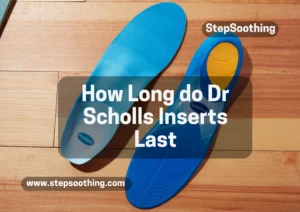Are you tired of the mystery surrounding orthotics and their lifespan? Dive into this comprehensive guide where we unravel the enigma behind how long orthotics last. This article is your key to understanding the lifespan of these supportive inserts, why it matters, and how to ensure you get the most out of them.
Unlocking the Secrets: How Long Do Orthotics Truly Last?

1. What Are Orthotics and Why Do People Use Them?
Orthotics, those discreet inserts tucked into your shoes, play a crucial role in supporting and aligning your feet. But what exactly are orthotics, and why do people turn to them for comfort and relief? Let’s explore.
i. The World of Orthotics:
Orthotics, also known as insoles or shoe inserts, are devices designed to provide support and alleviate various foot-related issues. Whether you suffer from arch pain, plantar fasciitis, or just seek extra comfort, orthotics can make a significant difference.
ii. Why People Choose Orthotics:
Individuals opt for orthotics for various reasons. Some use them to address existing foot problems, while others use them preventively. Orthotics can enhance foot stability, correct imbalances, and alleviate discomfort caused by conditions like flat feet or high arches.
2. How Long Can You Expect Your Orthotics to Last?
The lifespan of orthotics varies, raising questions about when it’s time to bid them farewell. Let’s delve into the factors influencing the longevity of these inserts and how to gauge when they’ve served their purpose.
i. Material Matters:
Orthotics come in different materials, each with its own durability. EVA foam, gel, and hard plastic are common materials. The type of material significantly impacts how long your orthotics will last. Softer materials might wear out faster, especially if you’re active and on your feet for extended periods.
ii. Daily Wear and Tear:
The more you use your orthotics, the quicker they wear down. If you wear them every day, especially for rigorous activities, they’ll naturally have a shorter lifespan. Consider having multiple pairs and rotating them to prolong their usage.
iii. Footwear Compatibility:
The type of shoes you pair with your orthotics can influence their durability. Tight or improperly fitting shoes can strain the orthotics, leading to quicker wear. Choose shoes that provide enough room and complement the design of your orthotics.
iv. Individual Lifestyle Factors:
Your lifestyle heavily influences how long your orthotics will last. Someone with a sedentary lifestyle may find their inserts last longer compared to an avid runner. Consider your daily activities and adjust your expectations accordingly.
Read More : How long do Superfeet Insoles last
3. Signs Your Orthotics Might Need Retirement
Like any good soldier, orthotics may show signs of wear and tear, signaling it’s time to retire them. Don’t ignore these red flags—your feet will thank you later.
i. Visible Wear and Tear:
The most apparent sign is visible damage. Cracks, frayed edges, or a flattened structure indicate that your orthotics are past their prime. Regularly inspect them for any physical changes.
ii. Reduced Comfort and Support:
If your once-comfortable orthotics now feel less supportive or fail to provide the relief they used to, it’s a sign they may need replacement. Orthotics lose their effectiveness over time, especially if subjected to constant stress.
iii. Foot Discomfort Returns:
One of the primary reasons for using orthotics is to alleviate foot discomfort. If you notice the return of pain or discomfort, it’s a clear indication that your orthotics might not be doing their job anymore.
4. Extending the Lifespan of Your Orthotics
Wishing to squeeze every last drop of support from your orthotics? Learn some tricks of the trade to maximize their lifespan and keep your feet happy.
i. Proper Cleaning and Maintenance:
Regularly clean your orthotics to prevent the buildup of dirt, sweat, and bacteria. Follow the manufacturer’s guidelines for cleaning to ensure you don’t inadvertently damage them.
ii. Rotation Is Key:
Avoid wearing the same pair of orthotics every day. Rotate between multiple pairs to distribute the wear and tear evenly. This simple habit can significantly extend their lifespan.
iii. Invest in Quality:
When it comes to orthotics, quality matters. Invest in well-constructed, durable inserts. While the upfront cost may be higher, the extended lifespan will likely save you money in the long run.
iv. Listen to Your Feet:
Pay attention to how your feet feel. If you notice any discomfort or changes, address them promptly. Ignoring foot pain can lead to more severe issues and reduce the effectiveness of your orthotics.
Read More : How Long do Vktry Insoles last
5. Can You Repair Worn-Out Orthotics?
The realization that your beloved orthotics are wearing out can be disheartening. But fear not! Discover whether there’s hope for reviving your worn-out companions.
i. DIY Repairs:
In some cases, minor issues can be addressed with simple do-it-yourself repairs. Small cracks or tears may be mendable with the right tools and materials. However, be cautious not to compromise their structural integrity.
ii. Professional Assessment:
For more significant damage or wear, it’s wise to seek professional help. Podiatrists and orthopedic specialists can assess the extent of the damage and recommend repairs or replacements based on your specific needs.
6.When Is It Time for New Orthotics?
Knowing when to say goodbye to your old orthotics is as crucial as understanding their lifespan. Uncover the signs that indicate it’s time to bid farewell and welcome a new pair into your life.
i. Typical Lifespan Expectations:
On average, orthotics last one to five years. However, individual factors, such as usage and materials, can significantly impact their longevity. Consider your specific situation when gauging the appropriate time for replacement.
ii. Changes in Foot Structure:
If your feet undergo significant changes, such as alterations in arch height or the development of new foot conditions, it may necessitate a new pair of orthotics. The old ones may no longer provide the support your evolving feet require.
iii. Updated Technology and Design:
Advancements in orthotic technology happen regularly. If your orthotics are outdated, you might be missing out on improved support and comfort. Consider upgrading to newer models to benefit from the latest innovations.
Read More : How Long do Insoles last
7.Addressing Common Myths About Orthotics
Misinformation often clouds the understanding of orthotics. Let’s debunk some common myths and set the record straight.
i. Myth: Orthotics Are a One-Time Solution:
Contrary to popular belief, orthotics aren’t a one-time fix. As your feet change and adapt, so do your orthotic needs. Regular assessment and, if necessary, replacement are crucial for ongoing foot health.
ii. Myth: All Orthotics Are the Same:
Orthotics come in various shapes, sizes, and materials. They are not one-size-fits-all. Customization is key to ensuring they address your specific foot concerns effectively.
iii. Myth: Orthotics Are Only for Foot Pain:
While many use orthotics for pain relief, they also serve preventive purposes. Athletes, for example, often use orthotics to enhance performance and reduce the risk of injuries.
8. The Role of Professionals in Orthotic Maintenance
Can you handle orthotic matters on your own, or should you enlist the help of professionals? Discover the significance of expert guidance in maintaining your orthotic health.
i. Regular Check-Ups:
Schedule regular appointments with a podiatrist or orthopedic specialist to assess the condition of your feet and orthotics. They can provide valuable insights and adjustments to ensure ongoing effectiveness.
ii. Customization for Optimal Results:
While over-the-counter orthotics can offer general support, custom-made orthotics cater to your unique foot structure and needs. Consider consulting with a professional to determine if custom orthotics are the right choice for you.
Read More : The Difference between orthotics insoles and shoe inserts
Conclusion: Key Takeaways
In the intricate world of orthotics, understanding their lifespan and when to bid them farewell is essential for maintaining healthy and happy feet. Here are the key takeaways:
- Materials Matter: The type of material in your orthotics influences their durability.
- Rotate and Refresh: Regularly rotate between multiple pairs and invest in quality to extend their lifespan.
- Listen to Your Feet: Pay attention to signs of discomfort, as they could indicate the need for replacement.
- DIY vs. Professional Repair: Minor issues may be fixable at home, but major damage requires professional assessment.
- Regular Check-Ups: Schedule regular appointments with a professional to ensure optimal foot health.
With this guide, you’re equipped to navigate the lifespan of orthotics and make informed decisions for your foot comfort. Say goodbye to uncertainty and hello to happy, supported feet!
Frequently Asked Questions (FAQs)
Let’s address some common queries about orthotics to ensure you have all the information you need.
While orthotics are designed for comfort, it’s not uncommon to experience mild discomfort during the initial adjustment period. If discomfort persists, it’s advisable to consult with a professional to ensure the orthotics are properly fitted and aligned for your feet.
Yes, you can transfer orthotics between shoes, provided the shoes have a similar shape and size. However, having dedicated pairs for different types of shoes is ideal for convenience.
Custom orthotics may have a higher upfront cost, but they offer tailored support designed to address specific foot issues. If you have unique requirements or pre-existing conditions, investing in custom orthotics can contribute to long-term foot health and comfort.
The lifespan of orthotics can vary based on factors like material, usage, and individual lifestyle. On average, they can last anywhere from one to five years. Regularly assessing their condition and addressing signs of wear can help determine when it’s time for a replacement.
Yes, orthotics can be transferred between shoes, provided the shoes have a similar shape and size. However, for convenience and optimal support, having dedicated pairs for different types of shoes is recommended.
Regular check-ups with a podiatrist or orthopedic specialist are advisable, especially if you use orthotics regularly. These professionals can assess the condition of your feet, make necessary adjustments to your orthotics, and provide valuable insights to ensure ongoing effectiveness and comfort.



